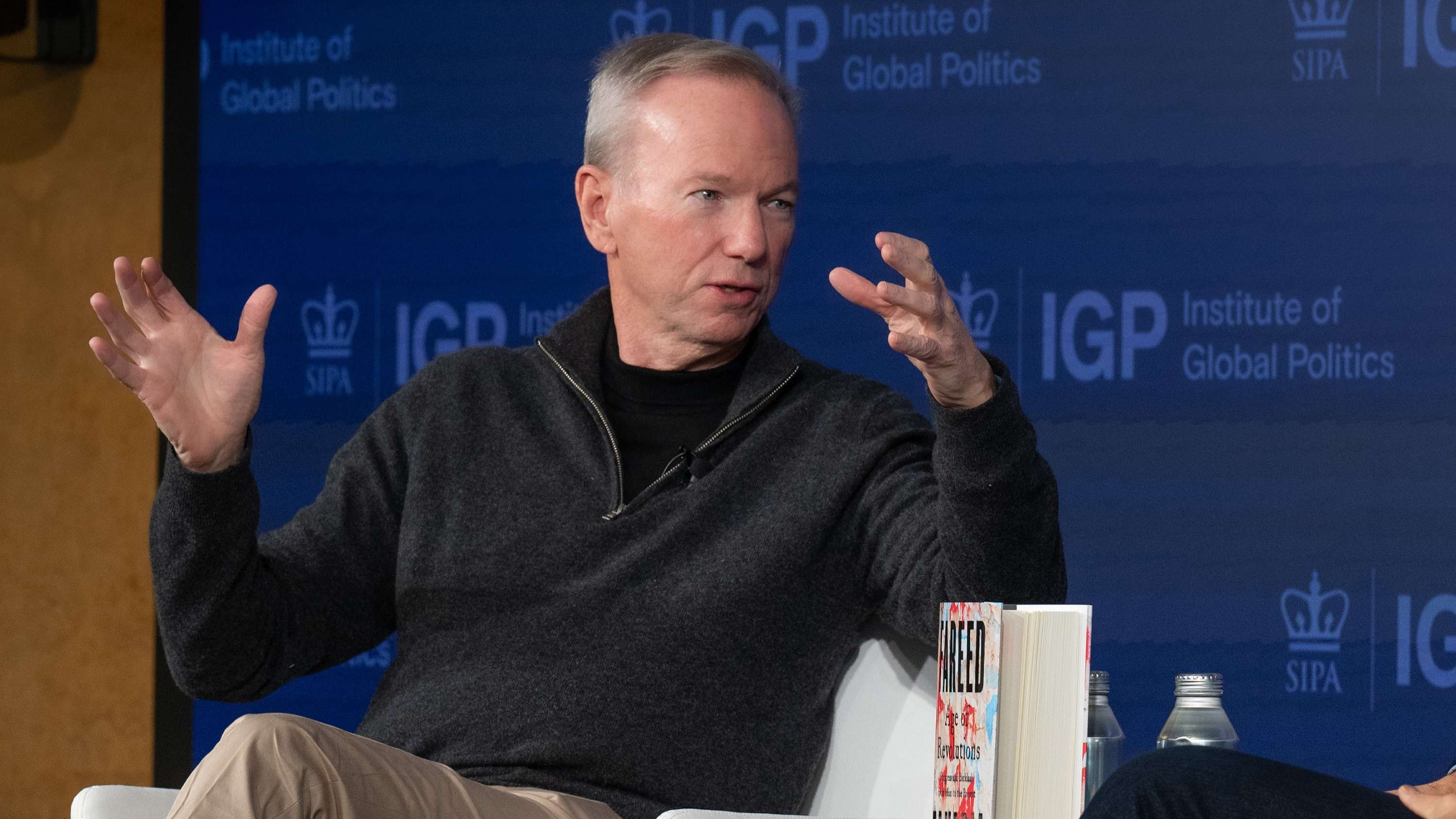Former Google CEO says AI firms should build data centers because 'we're not organized' to hit ambitious climate goals anyway: "I'd rather bet on AI solving the problem than constraining it and having the problem"
Former Google CEO Eric Schmidt says we're not organized to hit climate goals and it might be up to AI to solve this puzzle.

What you need to know
- Former Google CEO Eric Schmidt says companies invested in the AI landscape should proceed to build data centers despite their long-term effects on the climate.
- Schmidt claims the world isn't organized to hit these climate goals anyway. However, the early stages of the AI revolution can be mitigated using preventive measures like better batteries and power lines when constructing data centers.
- The CEO says the world is better off with access to advanced AI capabilities that could be leveraged to solve the climatic issues caused by the construction of data centers for model training and more.
As generative AI becomes more advanced, there's a dire need for computing power to train and operate AI-powered models via data centers. However, this is met by several bottlenecks, including lack of capital, construction timelines, permit restrictions, regulations, and low electricity supply.
Aside from the vast resources required to start building new data centers, the process has negative implications for sustainability and the environment. Microsoft has passionately expressed its efforts on this front and even highlighted its plans to go carbon-negative by 2030. However, with the AI bubble looming in the air, coupled with Microsoft and OpenAI's heavy investment in the sector, these plans will likely be setbacks.
While speaking at an AI summit in Washington DC, earlier this week, former Google CEO Eric Schmidt broadly discussed the progression of AI and its impact on the world. He indicated several precautionary measures that critical stakeholders in the AI landscape could implement to mitigate adverse effects on the climate, such as using better batteries and power lines when constructing data centers (via Business Insider).
However, Schmidt admitted that the rapid progression of AI would eventually overwhelm the elaborate measures. According to the former CEO:
"All of that will be swamped by the enormous needs of this new technology. Because it's a universal technology, and because it's the arrival of an alien intelligence we may make mistakes with respect to how it's used, but I can assure you that we're not going to get there through conservation."
When asked whether there's a possibility to pursue sophisticated AI advances without impacting the environment, Schmidt indicated, "We're not going to hit the climate goals anyway because we're not organized to do it." Perhaps more interesting, the CEO indicated
"Yes, the needs in this area will be a problem, but I'd rather bet on AI solving the problem than constraining it and having the problem."
All the latest news, reviews, and guides for Windows and Xbox diehards.
A report by McKinsey claims data centers are expected to consume 35 gigawatts of power annually by 2030. As you may know, Google and Microsoft consume enough electricity to power over 100 countries alone.
As it happens, Microsoft and OpenAI might have already cracked multi-datacenter distributed training for their AI models. Dylan Patel, a Boutique AI & Semiconductor Researcher, claims Microsoft and OpenAI have finally figured out a plausible way to train the LLMs across multi-datacenters. The researcher based his claims on the companies' actions, such as signing deals worth billions of dollars with fiber companies to connect their data centers and permits, highlighting their intentions to dig between data centers.
AI progression just seems expensive and complicated at this point
Since OpenAI's ChatGPT emerged, generative AI has been widely adopted and integrated across organizations. While it remains impossible to determine whether the technology is a fad, it has undoubtedly revolutionized medicine, education, computing, entertainment, and even the workforce.
NVIDIA CEO Jensen Huang predicted that the world might be on the verge of the next phase of AI, which will be centered on humanoid robots and self-driving cars. Admittedly, as AI tools become powerful and more capable, so does the technology's demand for money, cooling water, and robust training.
We know OpenAI spends up to $700,000 daily to keep ChatGPT running. Based on this premise, it's highly likely that the ChatGPT maker spends more on its advanced AI models like OpenAI-o1 or GPT-40, which spot sophisticated capabilities like writing and detecting errors in code to the extent of potentially rendering software developers jobless in the foreseeable future.
Last month, OpenAI CEO Sam Altman indicated that superintelligence might be "a few thousand days" away, but critical issues may deter this dream from coming to fruition. Altman indicated that it'd "take $7 trillion and many years to build 36 semiconductor plants and additional data centers" to fulfill his ambitious AI vision.
This remark happened after investors raised concerns over Microsoft's spending on AI projects, which had little to show in profit. On the other hand, OpenAI is reportedly burning through its revenue to fund advanced AI projects, making it susceptible to bankruptcy with losses of up to $5 billion within the next 12 months.
However, Microsoft, NVIDIA, Thrive Capital, and other vital investors extended the ChatGPT maker's lifeline through another round of funding after raising $6.6 billion, pushing its market capitalization to $157 billion. Despite the highlighted issues, OpenAI seemingly inspires confidence in investors, who predict it could become the world's dominant AI company worth trillions of dollars.
Interestingly, a new report suggests Microsoft could buy OpenAI within the next 3 years. It further details that the hype around AI is quickly fading and could potentially push investors to channel their funds toward other causes. An analyst further suggests that OpenAI could have difficulty convincing investors to participate in another round of funding if or when it runs out of resources again, opening it up to acquisitions by investors with deep pockets like Microsoft.
OpenAI is already stuck between a rock and a hard place courtesy of its latest round of funding. The ChatGPT maker will reportedly need to return the money raised to its investors if it can't transform into a for-profit entity within the next two years.
Experts predict that staff members, board of directors, regulators, and other key stakeholders will be reluctant to sign off on the decision. As you may know, the firm is already fighting a legal battle in court over a stark betrayal of its founding mission filed by Elon Musk.
🎃The best early Black Friday deals🦃
- 💾Seagate Xbox Expansion Card (1TB) | $129.99 at Best Buy (Save $70!)
- 📺LG Curved OLED Monitor (32-inches) | $849.99 at Amazon (Save $675!)
- 🎮ASUS ROG Ally (Z1 Extreme) | $499.99 at Best Buy (Save $150!)
- 🔊2.1ch Soundbar for TVs & Monitors | $36.99 at Walmart (Save $63!)
- 💻Dell G16 Gaming Laptop (RTX 4070) | $1,299.99 at Dell (Save $450!)
- 📺LG C4 OLED 4K TV (42-inches) | $899.99 at Best Buy (Save $500!)
- 💻Samsung Galaxy Book4 Edge (X Elite) | $799.99 at Best Buy (Save $550!)
- 💻Dell XPS 13 (X Elite) | $999.99 at Best Buy (Save $500!)
- 🎧Sennheiser Momentum 4 ANC | $219.95 at Amazon (Save $280!)
- 💻HP Envy 2-in-1 14 (Ryzen 7) | $649.99 at Best Buy (Save $400!)
More Prime Day deals and anti-Prime Day deals
We at Windows Central are scouring the internet for the best Prime Day deals and anti-Prime Day deals, but there are plenty more discounts going on now. Here's where to find more savings:
- Xbox controller deals: Walmart | Target | Best Buy | Amazon | Newegg
- Xbox SSD storage deals: Walmart | Target | Best Buy | Amazon | Newegg
- Gaming headset deals: Walmart | Dell | Target | Best Buy | Amazon
- MicroSD storage deals: Walmart | Target | Best Buy | Amazon | Newegg
- Gaming handheld deals: Walmart | Target | Best Buy | Amazon | Newegg
- Laptop deals: Walmart | Target | Best Buy | Amazon | Newegg
- Copilot+ AI laptop deals: Walmart | Target | Best Buy | Amazon | Newegg
- Monitor deals: Walmart | Target | Best Buy | Amazon | Newegg
- Mini PC deals: Walmart | Target | Best Buy | Amazon | Newegg
- Gaming keyboard deals: Walmart | Best Buy | Amazon | Dell | Newegg
- Gaming mice deals: Walmart | Best Buy | Amazon | Dell | Newegg

Kevin Okemwa is a seasoned tech journalist based in Nairobi, Kenya with lots of experience covering the latest trends and developments in the industry at Windows Central. With a passion for innovation and a keen eye for detail, he has written for leading publications such as OnMSFT, MakeUseOf, and Windows Report, providing insightful analysis and breaking news on everything revolving around the Microsoft ecosystem. While AFK and not busy following the ever-emerging trends in tech, you can find him exploring the world or listening to music.

